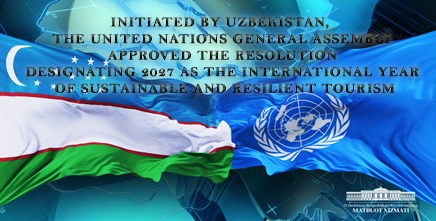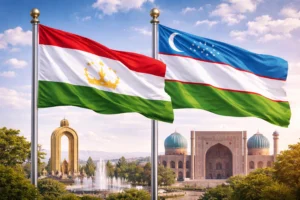UN General Assembly approves Uzbekistan’s 2027 Sustainable Tourism Resolution

On 26 February 2024, the United Nations General Assembly (UNGA) passed a unanimous resolution proclaiming 2027 as the International Year of Sustainable and Resilient Tourism. Spearheaded by Uzbekistan and supported by 80 co-sponsoring countries, it aims to highlight the importance of sustainability and resilience in the tourism sector.
This groundbreaking resolution, deeply rooted in the insightful thesis presented by President Shavkat Mirziyoyev at the Samarkand session of the General Assembly of the World Tourism Organization (UNWTO) in October 2023, underscores the imperative of adapting the tourism sector to the contemporary challenges and problems of our age, advocating for a paradigm shift towards sustainability and resilience in tourism practices.
At the core of this resolution lie the principles articulated by President Shavkat Mirziyoyev, emphasizing the indispensable role of tourism not only in safeguarding the cultural heritage of myriad civilizations but also in fortifying the foundations of peace and tolerance across the globe and upholding the diverse values of people everywhere. The resolution brings to light the transformative power of tourism in fostering greater awareness and appreciation of the rich cultural legacies and values of different cultures.
The resolution further emphasizes that sustainable tourism, including ecotourism, intersects with all three dimensions of sustainable development and contributes significantly to the Sustainable Development Goals (SDGs). It outlines how sustainable tourism can spur economic growth, reduce poverty, create jobs, promote sustainable consumption and production patterns, and ensure the sustainable use of marine resources. Moreover, it highlights the importance of developing tourism in a way that conserves the environment, protects biodiversity, and addresses atmospheric pollution.
Member states are encouraged to adopt effective strategies for sustainable and resilient tourism, recognizing its potential to alleviate poverty, empower women economically, and ensure inclusive participation from all segments of society, including youth, older persons, and individuals with disabilities. The resolution acknowledges tourism’s vast potential to bridge cultural divides, generate new opportunities, and drive sustainable development forward.
Impact of this Resolution
This resolution emphasizes the importance of strengthening and implementing effective measures such as the development of a global safe tourism code to address tourists’ security issues and the creation of an international Program of action for the development of green tourism through deepening international and regional cooperation. Sustainable and resilient tourism is a pivotal tool for poverty alleviation, fostering gender equality, and ensuring inclusive participation from youth, the elderly, and persons with disabilities, thereby facilitating economic empowerment primarily through the creation of job opportunities and incomes. It also acknowledges the vast potential of the tourism sector, as one of the largest segments of the global economy, to bridge cultural divides, spawn new opportunities, and propel sustainable development.
Particularly, it points to the significant role sustainable tourism can play in conserving vulnerable natural areas and habitats, enhancing local cultures, improving quality of life, and empowering women and youth. It stresses the urgent need to combat the global decline in biodiversity, underscoring the sector’s responsibility towards environmental conservation and its position as a pivotal force in promoting socio-economic development, cultural preservation, and environmental conservation.
Uzbekistan, at the forefront of this initiative, showcases its rich cultural heritage and significant strides in tourism development. Uzbekistan has emerged as a beacon for tourists worldwide, with 8.4 thousand cultural heritage sites and 122 museums. The leadership’s laudable efforts in preserving the Silk Road heritage, particularly in regions such as Karakalpakstan, Andijan, Kashkadarya, Jizzakh, Surkhandarya, and Tashkent, and in the cities of Samarkand, Khiva, and Bukhara, act as a facilitator of uniting East-West civilization. Uzbekistan’s liberal visa policies for citizens of more than 90 countries, its initiatives to promote Shakhrisabz as the “ECO Tourism Capital for 2024,” and the comprehensive adoption of development strategies, regulatory enhancements, and effective institutional frameworks reflect its unwavering commitment to boosting its tourism sector. Uzbekistan’s concerted efforts to preserve its historical and cultural heritage, coupled with its drive to create attractive tourist destinations and assert itself on the international stage, emerged with impressive results. The country’s prioritization of tourism industry development, as part of its broader, large-scale reforms aimed at modernizing the nation, is aimed to attract an estimated 7 million tourists by the end of this year, with projections soaring to 15 million international and 25 million domestic tourists by 2030.
This resolution will help the international community’s collective and joint efforts to embrace sustainable and resilient tourism as a vital cornerstone for economic development, cultural preservation, and environmental conservation, both regionally and globally.


